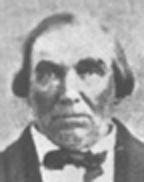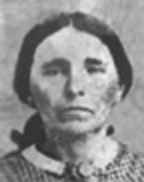

James William Huntsman
Hannah Davis
Church histories are replete with Missouri persecutions by
mobs. All of this came to the Huntsman's with their baptism. Hardly
had they settled in Caldwell County when they were ejected from their
house and home with all other Mormons. With them, they moved to the
City of Nauvoo, Illinois, Lot 3, Block 64, where their Nauvoo home was
built.
On January 1, 1846, James William and his wife, Hannah, were
admitted into the new Temple where they received all the blessings of
the endowment and were sealed as man and wife for time and all
eternity.
James William Huntsman labored as a carpenter on the Nauvoo
Temple and was also called to guard this building from the destroying
hands of the vandals and riffraff surrounding the City of Nauvoo.
Fortunately, the Church and the members had supplied themselves with
the best hand tools and implements.
About this time or before, the Illinois State Officials backed
and aided the mobbers to plunder, rob, and drive out the Mormons.
Wagons and teams were the prime booty to be taken, so as to
leave as many on foot as possible. There were also many converts
coming from Europe who had never had any means of transportation.
The great need was to make wagons.
Such skilled workers as Brother Huntsman were all to work
in relays around the clock, either in wagon shops; improvised shops,
or with some in former stores.
Much valuable and indispensable machinery and other Church
property, such as a printing press, had to be guarded while being
moved. Brother Huntsman helped to stand off the rabble mob while
all this property and the weak, poor, and infirm Saints could be
evacuated.
Now so much time had been used in shop and guard duty that
James William hired out to one of those Gentile newcomers, who had
bought, at great bargains, farms and crops. He and others first shelled a great amount of corn. Then
they went to the wheat field, 12 miles east of the city, harvest the
wheat. While going to the wheat field, one day, seven Mormons and a
Gentile fellow worker were soon surrounded by a mob of about seventy
men who forced them to lean over a rail across a ditch where they
proceeded to give them 20 lashes with a hickory whip. Because he
was found in such bad company, the non-Mormon received the same
punishment.
The three Church leaders left in charge at Nauvoo signed a
treaty with mob leaders and State-Aids-in-Charge, but the mob,
disregarding the treaty, walked in and took over. Those who were
too feeble and weak to resist they abused as well as robbed. The
Huntsman family was allowed to load into a two-wheel cart drawn by
an old horse what they could get away with. His good team, wagon,
and all valuables were stolen.
They crossed to Montrose, Iowa, where they remained over
the winter. The whipping occurred July 11, 1846, and the move was in
late September. With them were the six children, but somehow they
all survived to reach Council Bluffs on the Potawatomi Indian lands in
October, 1847. Here they had to start from scratch not only to
survive, but also to gain a new outfit and provisions for the journey
west.
Mention has been made of the salvaging of tools and other
things necessary for making equipment. Diligently, patiently, and
steadily, the father and family all labored without stopping to
complain about their losses. Two good wagons were built by James
William by hand labor and some good work cattle and cows were acquired.
Regardless of the hardships, robbing and expulsions, not
even childbearing was postponed. While living among these
Potawatomi Indians, two more sons were born to Hannah and James
William. The last one was David Orrin who arrived July 24, 1851,
while Hannah's husband was away across the plains. He and their
daughter, Sarah, then 17, had left May 10, 1851, to go ahead to
find and locate a new home base beyond the Rockies
James William Huntsman decided to locate near a
spring at the southern point of the Great Salt Lake where there were
ranching possibilities.
Reports say that the father worked around the city that
winter of 1851-52, then he climbed over the mountains and met the
family at Fort Bridger, where he saw for the first time his littlest
Potawatomi boy. To this new ranch to be made, the family came, soon
after their arrival in the City of Salt Lake on September 1, 1852.
Now while the father of this family was on this preliminary
trip, we can be sure that Hannah and the girls were not just sitting
idle. Mother and the girls were busily carding wool, spinning,
weaving, and sewing by hand a goodly supply of clothing. The lads
were helping out the Elders on the Church farms on land borrowed from
Indians, so they earned their supplies to take themselves over the
plains. They were prepared on June 2, 1852, to enter the caravan of
100 wagons in the company of fifty wagons.
Source: all information is from Huntsman Annals by Lamond Huntsman 1971.
Page 109 of the Huntsman Annals states that a complete genealogy
record was microfilmed by Lamond Huntsman in 1966 and put in the
Salt Lake Genealogy Library.
James William and Hannah: #10 and #11 on Chart 3
|